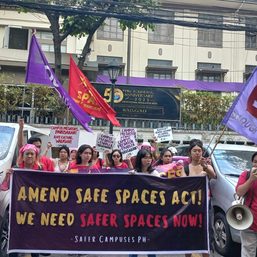SUMMARY
This is AI generated summarization, which may have errors. For context, always refer to the full article.
![[OPINION] Society’s saviors? The unnecessary burden on Filipino youth](https://www.rappler.com/tachyon/2021/05/reimagining-youth-vote-May-25-2021.jpg)
One year before the elections, the youth vote — both as an idea and as an advocacy — has become trendy again.
And it manifests in different ways. On social media, young people are prodding one another to #RegiToVote. Last weekend, young celebrities and online personalities launched “Love Kita Pinas.”
To be sure, asking the youth to register for the elections is a noble endeavor. After all, research suggests that starting early is predictive of habitual voting, which is crucial in ensuring that every election is convincing to the public.
At the same time, the Commission on Elections is expecting at least four million first-time voters. Given this number, many in civil society believe that the youth will make a difference next year.
But will they?
Those among us who are invested in the youth and the future of the country need to unpack the youth vote — what it really means and what assumptions underlie it. We need to confront our biases if we wish to effectively engage a bigger proportion of young Filipinos today.
Assumptions
The first assumption is that the youth vote is a collective choice distinct from the mainstream. This is the conviction of youth-led groups behind #MasMaramiTayo and #40MStrong (referring to Filipino voters 18 to 39 years old in 2022), for example.
But we need to be both honest and cautious. In 2019, just before the elections, I disaggregated survey data according to age brackets. No progressive candidate landed in the top 12.
True enough, not even one from the opposition won in the senatorial elections. This calls into question claims that young people gravitate towards alternative candidates.
The unfortunate reality is that these claims are often based on what trends on social media.
We have here a painful lesson: Our “woke” echo chambers on social media tend to be misleading. What comes across as trendy is, in the end, not really far-reaching. [READ: Youth urged to take control of their fate in 2022 PH elections]
The other assumption is that young people are our society’s saviors.
James Jimenez has written an open letter to the Filipino youth: “I challenge you and your generation to lead the way forward so that the rest of us may follow. I have no doubt that you are up to the task. You have to be. An entire nation is depending on you.”
Once again, I recognize the passion, but my reservations remain. Calls like this are an unnecessary burden on our young people.
It is not, for one, fair that adults place the responsibility on the youth to correct the political and economic mistakes the former have made.
The problem is that Filipino youth take it upon themselves to change society. And that is not judicious either. Too often it deflects accountability from the adults to the youth.
(This of course is not to deny the capacity of our youth to aspire and build a better future. History teaches us that the idealism of the youth is a source of hope for any society.)
Intergenerational injustice
As a people, we need to be honest about the inequitable burden we place on young Filipinos — especially these days.
Think about it. In the midst of the pandemic, young people have been in fact the most affected sector. Their education has been compromised, and in a significant way, their capacities as well.
And given the economic impact of COVID-19, their fighting chances for a better future have been rendered uncertain as well.
Given the state of affairs, why do we need to ask the youth to pay for the sins of their mothers and fathers?
Without us realizing it, pinning our hopes on the youth is a form of intergenerational injustice.
“As members of each generation pass through life,” according to political philosopher Janna Thompson, “they acquire obligations and entitlements in respect to the members of preceding and succeeding generations.”
Intergenerational justice calls for intergenerational accountability.
In the context of the Philippines, however, our youth have too many obligations and far too few entitlements.
Reimagine the youth vote
So, what can be done?
It’s time to reimagine the youth vote. Calling for young people to register for the elections is clearly not enough. It is but a narrow view of political participation.
As Kristine Reynaldo lays down for her readers, bigger reforms are needed to make the electoral system work for all. In her view, there’s a lot more that needs to be done beyond the elections.
This means a collective effort across generations is needed to ensure that the mistakes of the past are corrected and never repeated. From the virtual classroom to the halls of policymakers, young people need to be part of conversations about issues that endanger their future.
Access to education, quality of health care, job security, and mental health are just some of the issues at stake for them.
In the months ahead, I thus hope that calls for the youth to register will evolve into concrete spaces for them to discuss ideas without fear of cancellation.
I hope too that in lieu of televised debates between candidates, we create high-profile spaces where they face the youth to listen to their struggles and respond accordingly.
Young Filipinos for far too long have been dismissed and taken advantage of. It’s time that the tables are turned. – Rappler.com
Jayeel Cornelio, PhD is Associate Professor and the Director of the Development Studies Program at the Ateneo de Manila University. He is the editor of Rethinking Filipino Millennials: Alternative Perspectives on a Misunderstood Generation (UST Publishing House, 2021). Follow him on Twitter @jayeel_cornelio.
Add a comment
How does this make you feel?
![[WATCH] In The Public Square with John Nery: Preloaded elections?](https://www.rappler.com/tachyon/2023/04/In-the-Public-Square-LS-SQ.jpg?resize=257%2C257&crop=414px%2C0px%2C1080px%2C1080px)
![[Newspoint] 19 million reasons](https://www.rappler.com/tachyon/2022/12/Newspoint-19-million-reasons-December-31-2022.jpg?resize=257%2C257&crop=181px%2C0px%2C900px%2C900px)

![[OPINION] The long revolution: Voices from the ground](https://www.rappler.com/tachyon/2022/06/Long-revolution-June-30-2022.jpg?resize=257%2C257&crop=239px%2C0px%2C720px%2C720px)
![[OPINION] I was called a ‘terrorist supporter’ while observing the Philippine elections](https://www.rappler.com/tachyon/2022/06/RT-poster-blurred.jpeg?resize=257%2C257&crop_strategy=attention)





There are no comments yet. Add your comment to start the conversation.